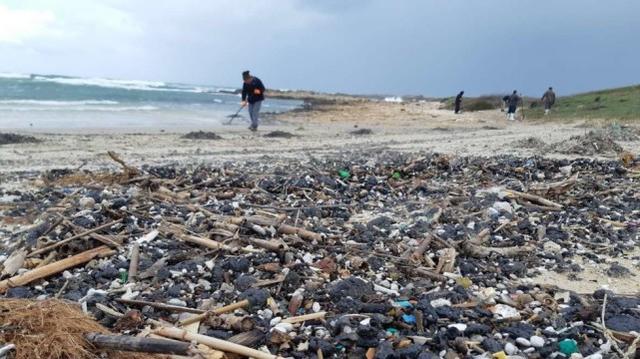Israeli officials say they're facing the biggest ecological disaster in the country's history. An oil spill in the Mediterranean Sea damaged about 90% of Israeli beaches. NPR's Daniel Estrin reports from the site of a cleanup.
(SOUNDBITE OF SNIFFING)
DANIEL ESTRIN, BYLINE: Ugh. You can really smell the tar here. I'm on Palmahim Beach. I just passed some ruins from hundreds of years ago, an early Muslim fortress. Down here on the beach, the seashells are just caked in shiny black tar. And there are dozens of volunteers helping with the cleanup. This is a group of people who have been out of work because of the coronavirus. They've been deputized to help clean up here. And then on the other side of the beach, I saw a group of soldiers and just volunteers from the public, like Miri Sosinsky.
MIRI SOSINSKY: I was so frustrated, sad and a bit angry because of what happened — this big pollution of somebody who's recklessly caused a lot of damage. I don't know how we can deal with collecting all this small — you can see — small pieces of tar.

ESTRIN: Itzik Plli with Israel's National Parks Authority says 92% of Israel's beaches have suffered some form of damage, from a beach close to the Gaza Strip all the way up to Israel's northern border with Lebanon. Officials still don't know the extent of the damage in the sea, and they worry about the small bits of toxic tar in the sands that could eventually seep into Israel's groundwater.
ITZIK PLLI: The easy example is, when you're eating a soup, instead of salt, you're putting inside poison. You're poisoning all of the ecological system — all the turtles, fishes. All the biology system in the sea is damaged. We found here turtles that are dead, covered with tar.
ESTRIN: Officials say satellite images suggest a ship spilled oil beyond Israel's territorial waters a couple of weeks ago. Israeli and European authorities are investigating what happened. And every day, hundreds of volunteers are coming to Israel's beaches to pick out little pieces of tar from the sands, a cleanup effort that could likely take years.
Daniel Estrin, NPR News, Palmahim Beach.












